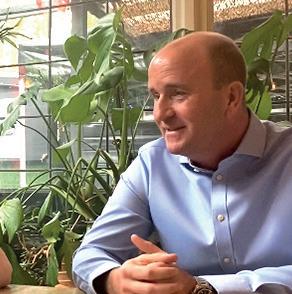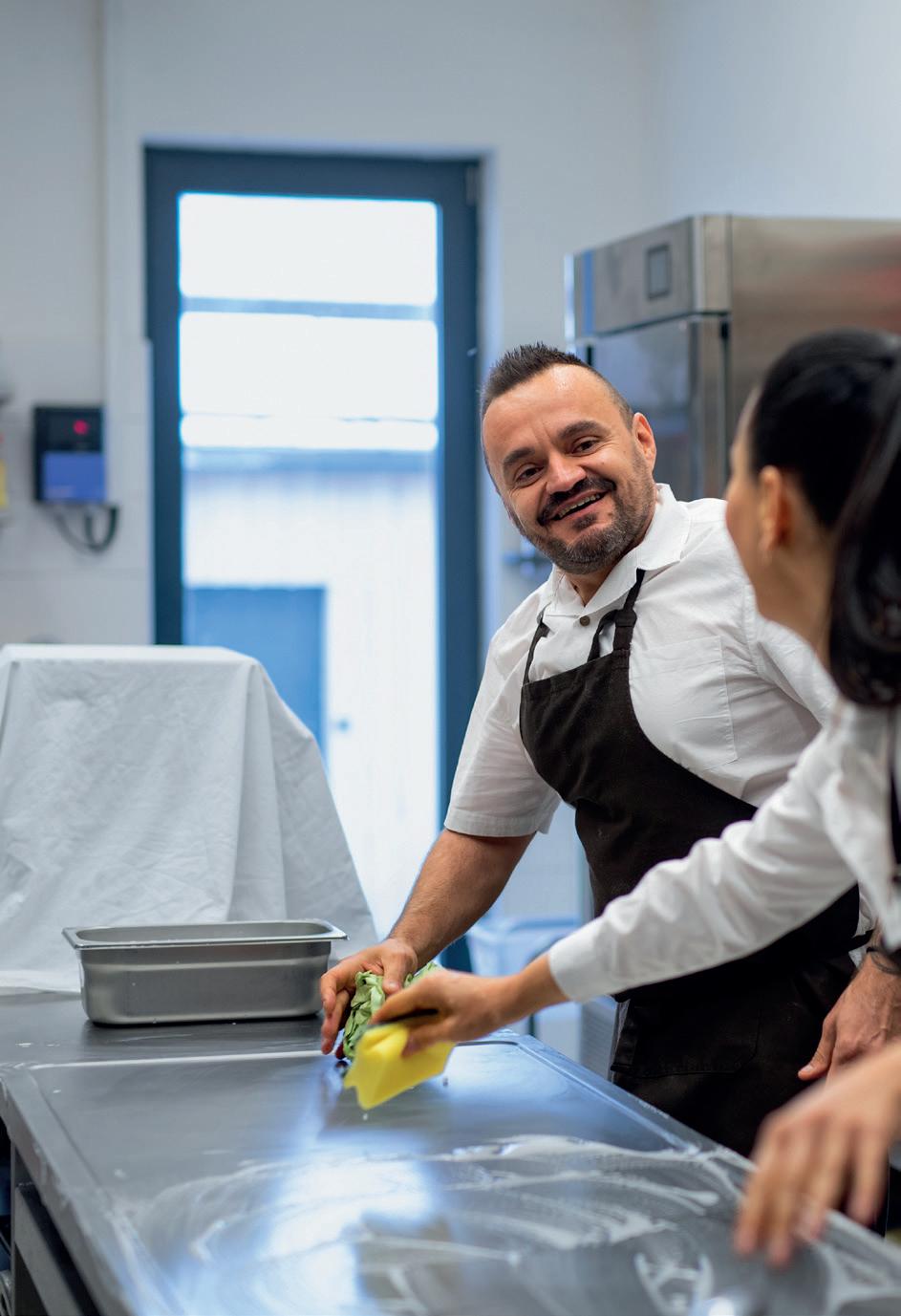Empowering Neurodiversity in the Workplace
A guide to help managers build high-performing, neurodivergent teams within hospitality’s caring and supportive environment.



A guide to help managers build high-performing, neurodivergent teams within hospitality’s caring and supportive environment.


Hospitality has a mission to create truly diverse and brilliant teams. Every one of us is unique and our sector wouldn’t and couldn’t be what it is, without all the differences that make us who we are.
There are such a variety of roles, work patterns and tasks that can be broken down and divided to suit building a neurodiverse team. Every one of us has a preference for new tasks or routine, behind the scenes or front of house or operational versus sales. It does require a bit more time and effort to adapt roles but with that comes opportunity for flexible working patterns to suit busy periods and the ability to recruit aptitude to meet the needs of your business.
LTC is on a mission to help the licensed trade celebrate difference and end the stigma that excludes many candidates from entering the workplace. That is why we have put this guide together for you in partnership with experts.

What is Neurodiversity?
You may hear terms such as neurotypical and neurodivergent and we explain these terms below but most importantly, all we need to know is that everyone’s brain works differently, and these differences are normal.
Embracing neurodiversity is an open invitation for everyone.
• Neurodiversity refers to a general diversity of minds. It includes people who are neurotypical and neurodivergent.
• Neurodiverse is an adjective. Your workplace can be neurodiverse. An individual working within your business may be neurodivergent.
• Neurodivergent describes an individual whose way of thinking falls outside of society’s defined version of normal – or neurotypical. You can also use ‘divergent thinker’.
• Neurotypical are those who society would generally deem to be “normal”.

What is Neurodiversity?
Many of us will know an autistic person or someone with ADHD or dyslexia. In addition, brain trauma, epilepsy or just a unique brain, can influence how that individual needs to receive and share information.
In the UK, approximately:
• 1-2% of people are autistic.1 • 5% of people are diagnosed as having ADHD.2 • 10% are believed to be dyslexic.3
Just as people have unique personalities, strengths, and challenges, we also have unique ways of thinking, learning, and experiencing the world - and that’s neurodiversity.

With different perspectives, teams become better at problem-solving, spotting new opportunities and finding innovative solutions.

Your customers also come from all walks of life and having a diverse team means you can connect with customers in unique ways, most importantly showing that you offer an inclusive and welcoming environment. It’s good for business.

“Having offered placements and jobs to more than 250 people with different needs, my experience is that individuals with neurodevelopmental differences are passionate about working and are fully engaged in whatever task you have asked them to do. There is a vast amount of talent out there just waiting for an opportunity, and our industry can lead the way in providing this.”
Stuart Green, The Cabbage Patch

• Strong attention to detail
• Untapped talent
• An inclusive reputation

• Confidence
• Self-esteem
• Sense of purpose, fulfil potential and contribute to society

• Creative and solutions-focussed
• Staff retention
• Customer-centric
Being known for taking an inclusive approach to recruitment will open your venue to a whole new community of people. We know from our members that employing people with diverse skills creates safe spaces, with regular bookings from friends, family and local communities.
Creating a neurodiverse team requires time, thoughtful recruitment, onboarding, and retention strategies.
Focus on these key areas:
Good Practice
• Check for organisational policies and guidelines.
• Explore diverse recruitment channels to include individuals with varied abilities and aptitudes.
• Actively work to reduce stigma, fostering inclusion for neurodiverse candidates.

Communication
• Use straightforward language and clearly outline expectations, tasks, and deadlines.
• Provide information in multiple formats (e.g., written summaries, visual aids).
• Be patient, allow time for processing, and encourage clarification.
• Respect individual communication preferences, such as written notes or advance meeting questions.
• Foster a supportive environment by normalising differences and creating space for feedback.
• Offer flexible work arrangements, such as staggered start times for quieter commutes.
• Modify workspaces, like providing noise-cancelling headphones or access to quiet areas.

• Be aware that employees do not have to disclose.
• Not all neurodivergent people will consider themselves to have a disability. However, their neurodiversity is likely to meet legal definitions within the law under the Equality Act 2010.
• This makes it unlawful to discriminate against disabled persons in the workplace and reasonable adjustments must be made so that no-one is disadvantaged when doing their job.
• Contact the LTC management support line for guidance if you don’t have a HR team or even if you do.
By embracing these principles, you can build an inclusive team where everyone contributes their strengths.
Empowering
When taking positive action to build a more neurodiverse team, it’s helpful to think about role requirements and whether tasks and responsibilities can be carved differently to attract a broader talent pool.
Being more flexible in your thinking around shift patterns, grouping of tasks, job shares and identifying whether technical and/or people skills are the priority can help build a team that embraces difference and thrives.


“We needed some more support in the kitchen and when Sophie joined us, she very quickly became a trusted extra pair of hands. She really enjoys the routine of food preparation for service and quickly developed the right skills, freeing up others to focus on the cooking.”
Recruitment Manager
• What are the competencies required by the vacancy?
• Can you recruit for attitude, and upskill an individual?
• Can the role be filled by someone coming in for 1-2 hours, 2-4 times a week? E.g. tasks to assist the chefs during prep, or waiting staff pre-service, responsibility for maintaining outside areas? Is there a job share option?
• Use Plain English and avoid jargon (e.g. Visit www.plainenglish.co.uk).
• Clearly outline tasks, such as peeling vegetables or polishing cutlery.
• Actively encourage applications from diverse backgrounds: “We welcome individuals of all abilities, including neurodiverse individuals and those with Special Educational Needs.”
• Advertise through nontraditional channels to reach varied candidates from different backgrounds.
• Use visuals, such as icons and pictures, to make ads more accessible.

• Offer paid, on-thejob experience to help candidates build their CVs and assess mutual fit.
• Partner with local schools, colleges, and learning centres to find candidates.
• Approach colleges, learning centres and schools near you with a view to offering work experience and to find suitable candidates looking for work.

• Keep it straightforward and accessible.
• Extend deadlines to reduce pressure.
• Consider online, print, video applications to remove barriers.
“I really enjoyed it, particularly when I was serving drinks. I wasn’t so keen on the glass washing because the tray with all the glasses on was heavy and I was anxious that I might drop it and break the glasses. I would like to work in a pub, but I don’t like it when it’s noisy and busy, so pre-service and lunch times, which is when I did my work experience, worked well for everyone.”
Work Experience Student
• Allow more time for the interview process than usual. This allows the candidate to process (think) before answering questions.
• Be clear on the timeframe for the interview to minimise anxiety.
• Ask how you can support them in preparing for the interview? e.g. send questions in advance.
• Focus on potential by asking about their strengths, preferences, and areas of discomfort.
• Prioritise attitude over experience to recognize potential.
• Offer reasonable adjustments (see page 9 for examples) to reduce anxiety or stress around the interview. Will they need to bring someone to assist them?
By keeping job descriptions simple, broadening advertising methods, and providing accessible interviews, you can attract and support a diverse range of talent.

“This industry is crying out for people like Harry, who grow into efficient and loyal staff members. When Harry joined our team, he was excited to take on shorter shifts – and liked the repetitive nature of preparing for service. His attention to detail and commitment to get tables, cutlery and glassware just-so, was brilliant. Harry takes real pride in his role and now he’s embedded in the team, my focus can be on performance and growth.”
General Manager
When welcoming a new colleague with divergent thinking, additional support can help set them and the team up for success. Things to think about include:
• Provide a clear overview of the role, working hours, dress code, and workplace norms.
• Outline what to expect on day one (e.g., security pass, uniform).
• Ask how they’d like to be introduced to the team.
• Ensure the team is prepared with the training and support needed for inclusivity.
• Check the team has the support and training required to support a diverse and inclusive culture.
• Keep things simple and allow extra time for induction and training.
• Remember guidance on communication (see pages 8 and 16 of this guide).
• Use quiet, distraction-free spaces for initial conversations.
• Break tasks into clear, manageable steps.
• Offer adjustments as needed and assign a mentor for ongoing support.

• Respect privacy; share working preferences only with permission.
• Help build rapport by finding common interests.
• Ensure all new team members receive an equal, inclusive welcome.
• Use mixed formats with clear communication.
• Include visual aids, like pictorial reminders, for tasks and organisation.

“I’m just dying for a cup of coffee”.
Literal interpretation:
A person may think that you’re saying you are about to die from the lack of coffee.
“Spill the beans”
Literal interpretation:
A person may think that you want them to tip the beans out.
“We believe that work experience gives people the opportunity to develop the skills that are needed in the workplace, as well as being able to make new friendships and gain confidence, which will show them that they can have a role and be part of a team.
At Fuller’s we believe in welcoming people with different skillsets and strengths, because it creates really productive and highly performing teams.”
Monique Samra, Fuller’s People Experience Manager
Onboarding
Adapting the work environment and processes helps neurodivergent colleagues thrive by aligning with their communication and learning preferences.

Verbal Communication
• Use clear, simple language and avoid ambiguity.
• Provide short, written instructions for clarity (e.g. www.plainenglish.co.uk).
• Ask questions gently and respectfully.

• Utilise cue cards, images, or written/symbol lists.
• Encourage notetaking to aid understanding.
• Address sensitivity to noise by scheduling quieter shifts or providing quiet spaces for breaks.

• Be mindful of sensitivities to taste, smell, light, or temperature.
• Communicate role requirements clearly to manage these effectively.
• Tailoring these adjustments can empower team members to excel in their roles.
Understanding and valuing individual team members means your team is more likely to stay - and thrive.
Things to think about include:
• Set realistic and achievable to-do lists – giving anyone more than they can easily achieve will cause anxiety and stress.
• Help by breaking tasks into clear, manageable steps.
• When setting a task, give clear and simple instructions.
• Ask for confirmation (repeating back or taking notes) that your colleagues has understood.
• Be patient with interruptions or repeated explanations—apparent inattention may reflect overwhelm.

• Check-in regularly with what’s working for them and what could improve from their perspective.
• If supported by a carer or another person, they may wish that person to be copied into all correspondence. But, as you would for all other employees, you must seek their permission first.
• Assign a mentor or work buddy who can provide guidance and friendship.
• Gradually expand responsibilities with clear, step-bystep goals to build confidence and efficiency e.g. To be responsible for all vegetable preparation during lunch service.
Week 1 - Peel and chop potatoes. Clear away peelings and tidy work area.
Week 2 - Peel and chop potatoes. Prepare broccoli. Clear away peelings and tidy work area.
Week 3 - Peel and chop potatoes. Peel and slice carrots. Clear away peelings and tidy work area.
Week 4 - Peel and slice carrots. Prepare broccoli. Clear away peelings and tidy work area.
Week 5 - Peel and chop potatoes. Peel and slice carrots. Prepare broccoli. Clear away peelings and tidy work area.

• Once a colleague has been in post for a while, changing routine or process can be difficult for neurodivergent colleagues.
• Discuss any change in advance and give them time to adjust. Provide opportunity to see/handle any new items.
• Big or small, celebrate the wins as it builds confidence and loyalty.
By offering structured support and recognizing progress, you can sustain a motivated and capable team.


“Francesc is a key part of our team here and watching him gain confidence has been hugely rewarding. His presence on the team also brings everyone together, as working with someone facing extra challenges creates an environment where everyone wants him to succeed.
Francesc has gone from clearing tables to taking control of our 1,000-cover beer garden and he handles all new team member inductions - he’s brilliant and keeps our foodservice in order. ”
Liam McKeown,
The Drayton Court Hotel, Ealing
With 1 in 5 people considered neurodivergent, fostering an inclusive work environment benefits both your team and customers. By prioritising understanding, respect, and flexibility, you can create a workplace where everyone thrives. Things to think about include:
• Define neurodiversity and common conditions (see page 4).
• Celebrate individual strengths and uniqueness.
• Break down stereotypes to encourage inclusion.
• See pages 8 and 16.
• Highlight differences in communication and working styles using examples.
• Emphasise the importance of avoiding judgment or assumptions.

• Identify potential sensory challenges and discuss how to minimise their impact.
• Encourage team collaboration to reduce stress (e.g., offering help during busy times).
• Champion flexibility in tasks and rotas where possible.
• Spot signs of overwhelm, like withdrawal or distraction.
• Provide strategies for offering support, such as asking discreetly if they need help or suggesting a break.
• Reinforce the importance of respecting any adjustments or accommodations in place.
• Ensure the team understands antidiscrimination law and how they can help create an inclusive workplace.
• Highlight the benefits of inclusivity for team morale, customer satisfaction, and the business’ reputation.
• Regularly review team feedback and address concerns.
• Encourage continuous learning through additional resources or refresher training.
There are a lot of resources available from charities. Another option may be to approach your local SEN (Special Educational Needs) school or organisation for support? In return, you could offer work placements for their students.
Brain differences are natural variations rather than a disorder or deficit. Approximately 15-20% of the adult UK population are neurodivergent and below are a few examples.
• Difficulties with spelling, reading fluency and reading speed
• Slower verbal processing speed
• Reduced verbal memory and working memory

• Ability to view things from an alternative perspective
• Problem solving skills
• Creativity
• Visual/good pattern recognition
Dyscalculia
Impact
• Difficulty understanding number
• Difficulty with estimating numbers
• Slow to perform calculations
• Difficulty counting backwards, remembering maths facts and procedures
Strengths
• Ability to view things from an alternative perspective
• Problem solving skills
• Strategic thinking
Autism
Impact
• Difficulty interpreting verbal and non-verbal language, such as tone of voice, facial expressions, body language and therefore may avoid social interactions
• Literal understanding of language
• Difficulty in understanding the perspective of others
• Sensory sensitivity
• Anxiety
• May exhibit repetitive or routine behaviours
Strengths
• Attention to detail
• Ability to view things from an alternative perspective
• Problem solving skills
• Good at following protocols/ guidelines
• May enjoy repetitive tasks

ADHD Impact
• Poor attention to detail or hyper focused on stimulating tasks
• Poor time management/ prioritisation skills
• Impulsiveness
• Difficulty relaxing
• Excessive talking
Strengths
• Can hyper focus on tasks and be extremely productive
• Creativity
• Ability to view things from an alternative perspective
• Problem solving skills
• Energetic
• Hardworking & enthusiastic
• Interested in things

The Licensed Trade Charity (LTC) is committed to helping its members support more neurodivergent people into work in the hospitality sector.
The LTC has three schools, two of which are exclusively for children with a diagnosis of autism, LVS Hassocks in West Sussex and LVS Oxford in Oxfordshire. LTC believes work experience facilitates development of students’ skills and empowers them to overcome challenges and become more confident in a professional setting.
Students like Zach, who recently left LVS Oxford to start his Level 2 Apprenticeship in Customer Service at Blenheim Palace, having successfully completed two years’ work experience while still at school; “It’s something I thought I would never be able to do, because you are always having to serve different people,” explains Zach.

Melanie Walker, Vice Principal, LVS Oxford says “But LVS Oxford has been a bit like a pair of training wheels on a bike. You get better and better, and when they’re taken off, you almost don’t notice but are able to do so many more things.”
The Licensed Trade Charity has been helping licensed trade people and their families for over 200 years, providing practical advice, emotional support and financial grants. Through its helpline, counsellors are available who specialise in working with neurodivergent people. Funding may also be available for a specialist referral.
In the wellbeing platform there are many resources available on neurodiversity, from podcasts to panels to listening to people’s lived experiences.

“Work experience not only makes a significant impact on our students’ lives but also exemplifies the positive change that organisations bring about when they prioritise inclusivity and embrace the unique strengths and talents of all individuals.”
Melanie Walker, Vice Principal, LVS Oxford
Implementing worksheets such as these examples can help to support members of your team who are neurodiverse work more confidently and efficiently.
Tick each task when you have finished it
1. Put your apron on and wash your hands
2. Get potatoes, peeler and a container to put potato peelings in
3. Peel and chop all the potatoes
4. Put the potatoes in the saucepan that has the water in it
5. Put the peelings into the container and then empty the container in the food waste bin
Put a tick next to the smiley face that best shows how you feel about the tasks
1. Peeling and chopping potatoes
2. Peeling and slicing carrots
3. Preparing broccoli
4. Preparing all the vegetables for lunch service
Please visit www.licensedtradecharity.org.uk to access more resources that can help you support your team.
We would like to extend our appreciation to everyone who has played a part in the creation of this guide including Fuller’s, Kate Oppenheim, Basia, Fleet Street and Natural Selection Design.
Licensed Trade Charity, Heatherley, London Road, Ascot, Berks SL5 8DR
Registered Charity Number 230011
enquiries@ltcharity.org.uk
Call us 24/7 on 0808 801 0550
© Copyright Reserved. Licensed Trade Charity and KO-Media (UK) Ltd. 2024.